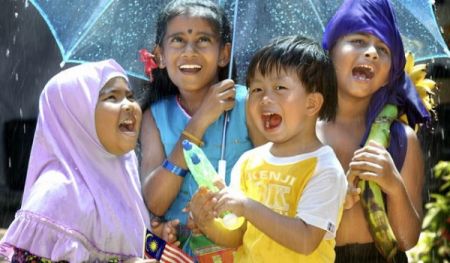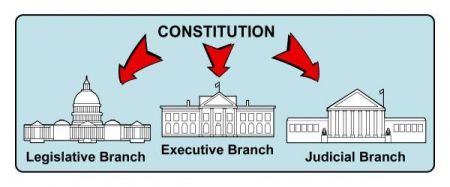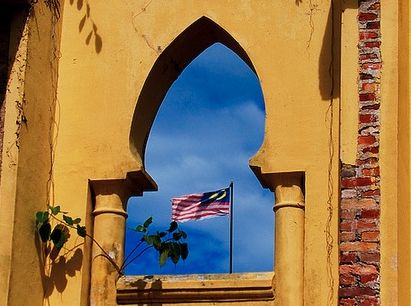If real democracy is interpreted as a place where different cultural groups can co-exist harmoniously with their rights intact, how does Malaysia fare? In the first part of his article, Galvin Wong examines the state of unity in our country against the backdrop of our political and legal systems.
Writer’s note: This is an article discussing whether a country like Malaysia can achieve true democracy without unity. True democracy might mean different things for different people. But for me, it means living in a country where the rule of the people (not the government or the majority) is practised. It means living in a country where there are no marginalised groups no matter how small they are. It means a country where freedoms and rights are protected.
Part 1 examines Malaysia’s political and legal systems briefly and also the presence of unity in our country throughout the nation’s history. If there are parts in this article that offend you, I am truly sorry but my only intention is to point out the facts and rationally discuss the issues at hand.
2011 was a troubled year for Malaysia and her peoples. As many positives as there were in this past year, there were many more negatives. It was a year of disappointments and broken promises. To paint such a bleak picture of 2011 is surely no way to start 2012 with full of hope and belief. But as George Santayana, a famous philosopher, once said, “Those who cannot remember the past, are condemned to repeat it.”
As Malaysia ventures into a new year and edges closer towards her 55th birthday, allow me to pose a question: exactly how far has our country come since 1957? In regard to the economy, we have certainly gained much ground. To move from being a mere supplier of rubber and tin for the British, to a country that attracts US$10 billion in Foreign Direct Investment last year and one expected to grow 4% in GDP next year (despite difficult economic conditions), is no small feat. Although there are still challenges such as the high poverty rate and the consistent budget deficit, we have certainly improved a great extent. Technologically speaking, we have also taken a great leap forward. The fact that almost every person in our country has a handphone and every family, a television or a computer, is testament to this.
However, has Malaysia succeeded in becoming a more improved democracy? Has she achieved greater equality among her peoples? Or succeeded in its pursuit of real unity? Unfortunately, I feel the answer is no. In fact, we seem to have extensively backslided in these aspects.

Malaysia’s political and legal systems have certainly never been one of the best in the world. The absence of a powerful and elected Dewan Negara has always led to the government passing a woefully high number of bills – uncontested – and without much scrutiny by Parliament. The Peaceful Assembly Act that seemed to have zipped through Parliament with little or no resistance must be one of the best if not most obvious examples.
The use of the simple-majority voting system (which guarantees victory to a representative with the majority of votes) as opposed to the preferential or proportional voting system often practised in countries like Australia, result in minorities never having a chance of representation in Parliament. It also ensures that one of the key objectives of a successful voting system – to have the number of votes translated into the number of seats won – remains unfulfilled. Of course, no democratic system is and ever will be perfect. But surely, there can be some development? Yet, although our government has had the power to facilitate such changes for the past 54 years, they have not done so. On the contrary, the defects of this already flawed system have dramatically increased.
1988 was the year that completely ruined the foundations of democracy in our country. It was the year that the separation of powers, a key concept in any democratic country, was tossed out of the window like trash. The idea of ‘separation of powers’ is to divide power between the 3 (Executive, Cabinet and the Judiciary) major governing institutions of a country to ensure that each is separate and independent of the other. Each of these institutions is tasked to act as a check and balance for one another in order that no one institution, the Executive in particular, wields excessive power that can be used against the country’s citizens and reduce a democracy to a dictatorship.

The government of the day at the time, not content with the control of 2 of these institutions (by possessing a majority in the Dewan Rakyat, they effectively had control of the Legislature), had also decided to tamper with the 3rd – the Judiciary. From that year forth, the ruling party silenced its opposition. All but one component of its opposition, however. That component was the Rakyat. We shall continue looking into this matter further in Part 2. But first, let us examine the presence of unity or more aptly, the lack of it in Malaysia.
Allow me to thus post this question now. In your opinion, has Malaysia ever experienced true unity? A true sense of togetherness? A true sense of being Malaysian together? I am too young to be able to give an opinion about the early years post-independence. But from what I know, Malaysia is a country whose peoples did not choose to come together on their own accord but were forced to co-exist in the beginning due to circumstances largely manufactured by the need of the British for workers. Many of the Chinese and Indian migrant workers did not expect to stay in this South-East Asian country permanently; indeed plans were such that they would return home once they had obtained enough funds.
In the Malay Dilemma, Dr Mahatir speaks of an intriguing situation in pre-independent Malaya where races mostly kept out of each other’s way. There were two main reasons for this: firstly, due to the imminent journey home, neither the Chinese nor Indians had bothered to interact and develop a rapport with the Malays; and secondly, the British had instituted the ‘divide and rule’ style of governance.
Moving on to the post-independence era. If there was a time when one could catch a glimpse of true harmony and unity between races, it was the brief period of euphoria succeeding the day Malaya first attained independence. The government was happy, as were the people. However, this period of serenity did not last. By 1962, Lee Kuan Yew had sparked major racial unrest by calling for a Malaysian Malaysia. Tunku Abdul Rahman, already worried about the possible decline in Malay influence both politically and socially due to the inclusion of the 1 million Chinese in Singapore, was forced to expel Singapore from Malaysia.
If the Tunku had expected the issue to end then, he was sorely mistaken. Already, the green shoots of social unrest caused by Lee Kuan Yew’s campaign had started to spread. Further, uneasiness regarding another potent issue – the income inequality among the races – was threatening to boil over. By 1969, the winds of unrest were raging in certain areas around the country, especially in the city centre. All the people needed was a trigger for the resentment and frustrations to pour out. That trigger came in the form of the General Election. Racial riots broke out across Malaysia, leaving 196 people dead, many others wounded, and a young country in chaos.
How was Malaysia expected to recover? In my personal opinion, it never did and it still hasn’t. The implementation of some national policies has not helped either. The New Economic Policy, for instance, was launched in 1971 as an affirmative action policy aimed at reducing drastic income inequities. It ended in 1990, failing to complete its objectives. In fact, this policy may have worsened an already unfavourable situation. Blatant favouritism shown by the government, especially in areas like university placement, may have further widened the rift among the people, with many losing hope in the country and choosing to leave. (Note the use of the word ‘may’; I have no concrete proof of the rift but for the high incidence of emigration as well as talk around me.)
And now, there is 1Malaysia. Whether the intentions of the politicians behind this campaign are pure or otherwise, I do not know. But I do feel this: from what we have seen and heard, it hasn’t really made much of an impact in the real sense. While I completely support its concept – to finally unite Malaysians under the banner of ‘Rakyat Didahulukan, Pencapaian Diutamakan’ – I must question what actions have been carried out to prove that the machinery is serious about implementation. KR1M? Faith Walks? These are all well and good and I understand that 2 years aren’t enough to solve a 54-year-old problem. But we do need solutions that strike at the heart of this very problem. And now is as good a time as any in the course of history to create such solutions.
More on this topic when you check out the following articles:
1. Malaysia’s Democracy: A Democracy on Life Support
3. Malays and Non-Malays – The Dilemma Continues
4. Race Relations Bill: Be Afraid, Very Afraid
5. Racial Unity: Where We Fail
(Featured image accompanying this article on the main page courtesy of Ihsan Khairir, source: www.flickr.com/x/t/0094009/photos/ihsankhairir/5781338101/)


i had a little dream i wrote in my blog .. i dream a dreamed called wasatiyah [ http://wp.me/p1ChLd-3q ] , where i dream that our Muslim rakan-rakan could lead us by being the leader in the petition to end Article 153 which led to so much abuse ..
You're on the right track. Malaysian (sic the people) need to ask themselves what have they done in pursuit of such goals and not just solution-o-politik
How to have solidarity bro when students your age and below now only stick with their own race, talk like the TVB movies and icons LOL sorry that is on the light side but for real. Do you know that during my time we can kepak any youth big or small sizes whatever color whoever the fathers, bro you tell me can you still do that during your school days. (BTW I am sure you do not know the meaning KEPAK Bro)
So you were only partly right after Tunku era, razak era we were still ok in schools until they foolishly let a west indies pendatang pusing pusing them with ikadah inkadah everything became rojak.
On your 1 malaysia of course we never need this AP & CO propaganda because bro during my time and now there is never 2 or 3 Malaysia so what the blady heck do you need 1 Malaysia except of course for the revenues and renenues from stickers, T shirt, bantings DO for these & DO for That all my kaki becomes FAT FAT